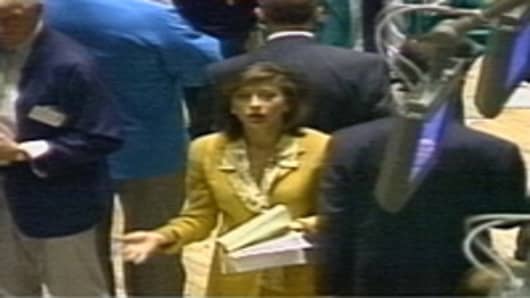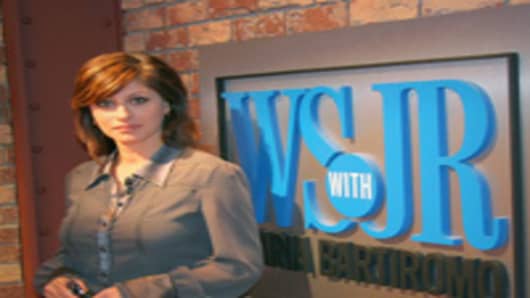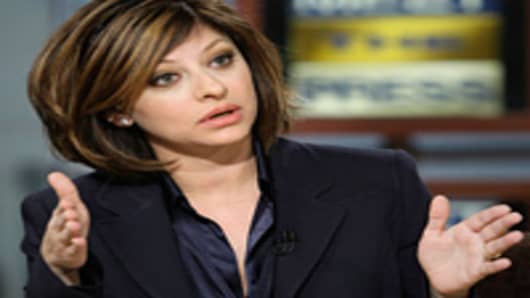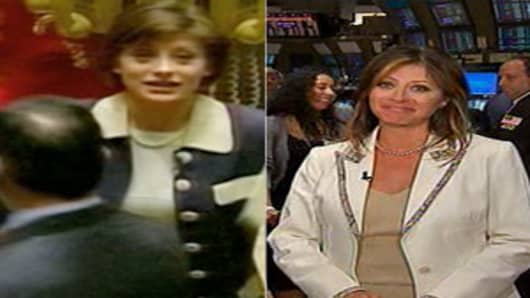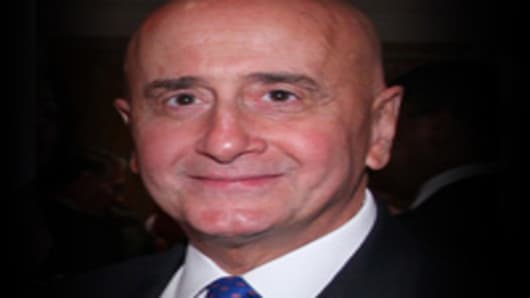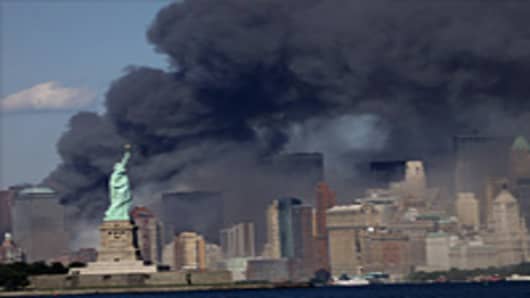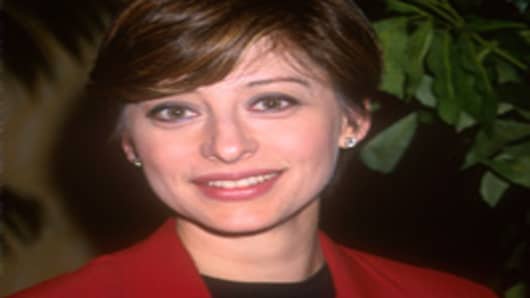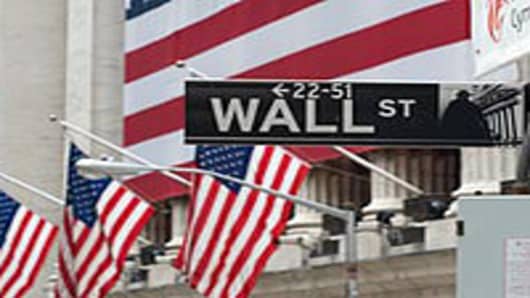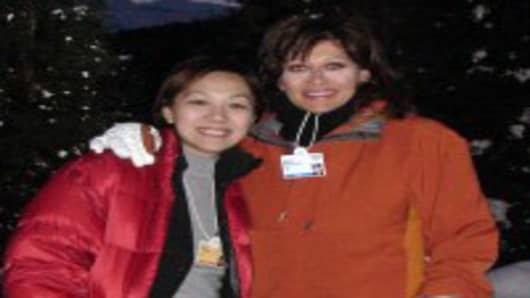CNBC’s Maria Bartiromohad her first live broadcast on the floor of the New York Stock Exchange fifteen years ago. NYSE Euronext celebrated the anniversary with Ms. Bartiromo ringing the opening bell this morning. I had the honor to join Maria and other CNBC colleagues on the podium.
Today - the tables are turned, I get to interview Maria Bartiromo. For Maria, it’s been an “amazing” and “emotional” time as she took me back over the years.
MARIA: I'm thinking back to so many different memories that I've had over the 15 years, and I'm so grateful to have really been at the apex, the nucleus of global finance for all of this time.
And, you know, it's amazing I don't know where 15 years has gone. Over the 15-year period I've been fortunate to be able to see so many different things like the explosion of the individual investor, where individuals – 15 years ago, felt empowered to invest on their own because they were empowered by so much information.
The second major trend that I watched from this front row seat was globalization, where one thing would happen in one corner of the world, and it would trigger reactions all over the world. We learned, certainly over the last 15 years, that the world is connected, and companies are looking all over the world for business, and populations are exploding in places like China and India.
Another major trend was the boom and then the bust in dot-com.
And I remember in the '90s when I was broadcasting on the floor and anything that had a dot-com at the end of its name was bid up and was celebrated.
We were entering a new era back then.
We were entering the year 2000, back in 1998 and 1999, and people felt like it was going to be really different.
We put different assumptions in front of us to measure the health of companies. We didn't even think about earnings or revenue growth. We were talking about hits to the Web sites and dot-com metrics. And, of course, that all blew up in our face when we had the bust in dot-com.
"We didn't even think about earnings or revenue growth. We were talking about hits to the Web sites and dot-com metrics. And, of course, that all blew up in our face when we had the bust in dot-com."
We also had the boom and the bust in oil, where we fell into another bubble-like mentality, where oil rallied all the way up to $147 a barrel because there was demand from the global economies because there's globalization. We fell into this idea that just because a market was going up it would continue to go up. When oil was at 147, I remember Goldman Sachs came out with a report, said it's going to 200. Of course, the next stop, all the way down, was $32 a barrel.
The biggest of them all was the financial collapse and the boom and the bust in housing, when home prices surged for no real reason other than an urgency that was in the market and this, again, this bubble-like theory where prices in, you know, pick any market—Phoenix, prices for homes were up 40 percent year over year. I mean, you know, was there any real reason for prices to be up 40 percent in Phoenix? Was the school system better? Was infrastructure better? You know, was population growth happening? No, none of that. There was just this urgency to get in on a market that was bubbling up. And then, of course, we had the bust, which led to the financial collapse.
LULU: There's been a global consolidation of exchanges around the world that's no longer just the New York Stock Exchange, but more of the NYSE Euronext combination, and other exchanges becoming global powerhouses.
MARIA: I think that's a result of globalization because companies want to be able to transact anywhere in the world.
If you're in Germany, you want to make sure that you can do business across the continent.
And if you're in Singapore, you want to ensure that you're doing business not only in America, but also in Southeast Asia.
As a result of globalization and business booming all around the world and this stock market mentality booming all around the world with individuals empowered, you had consolidation.
And you had, you know, so many exchanges globally teaming up.
Today you've got so many hubs of the world, whether it's Moscow or Dubai or, you know, Bahrain or Singapore, trying to be the financial hubs.
London for a little while overtook the US in terms of a major financial hub.
So you have transactions happening all around the world, and business consolidating to accommodate that.
MARIA: A COLD GREETING AT THE NYSE
LULU: How has the floor changed in the past 15 years?
When you first started you got bumped by some guy - it was packed, compared to now – which is fairly empty?
MARIA: The floor has changed quite a bit.
I mean, you know, when you look at what has happened in terms of the sheer number of people, you've seen a huge decline because the electronics system has taken over.
When I first got down to the floor 15 years ago, people were bumping into me. I was actually literally physically in their way because they needed to get to their post, they needed to get to the stocks that they were going to trade before the market got away from them. Today is a little different because everything goes through the electronic trading system. Although there are people on the floor, the business is really coming from elsewhere, away from the floor. The transactions are done electronically. That's why the floor has actually moved and created new electronic stations. It's night and day.
LULU: You weren't welcomed, right?
MARIA: I wasn't welcomed by everybody, for sure. I have to give so much credit to Dick Grassobecause he truly allowed us to broadcast from the floor. And he made it happen.
Because without Dick's support it would not have happened.
When I first got to the floor, while I did have some camaraderie with the guys, it wasn't across the board, there were some people who really did make it difficult for me.
I remember Mike Robbins, who really scared me and yelled at me and didn't want me around back then. I would walk around the building so that I didn't have to pass him because he hated me so much. But I kept coming back and I made sure that I knew my stuff so that he couldn't push me around, and then I found out that he was on the board of the exchange.
So there definitely were a group of people who felt that, `Why are we opening up this to the public? Why are we trying to demystify the markets?'
But in reality, Dick Grasso's vision was right, because you did want did want to open up the markets.
You did want to demystify what was going on because it's our money, and individuals do participate in the markets through pensions and mutual funds, and it's not just an institutional player's game.
It was groundbreaking, and it was a great vision that Dick had that allowed us to do it.
My colleagues at CNBC had to push me forward. I'm really proud of what I've been able to accomplish, and, really, what CNBC's been able to accomplish because we were first, and we were there.
However, very soon into it I did get a lot of camaraderie, and I had a lot of pals on the floor. When I got married, they did to me what they normally do to the guys… while I was in a conversation with somebody, I was standing at a post, unbeknownst to me, they were putting… they were tying a ball and chain around my ankle as a joke, and then I couldn't move. You know, and they did a lot of things like that.
MARIA REMEMBERS 9/11
LULU: Let’s turn to something a bit more serious, your birthday, September 11th, 2001. Back in 2001, when the 9/11 attacks occurred, you were broadcasting live at the New York Stock Exchange. What was that day like for you?
MARIA: It was a tragedy for everybody.
I got into work like I always do, and it was my birthday, and I remember my assistant at the time had gotten me a beautiful bouquet of flowers.
We saw the first plane go into the first building on television. And then my boss, David Friend, calls me up and says, `Go outside and call into the studio. Tell us what's happening.'
So in a minute I was up on my feet, running to Broadway, and I got out to Broadway, and there were throngs and throngs of people looking straight ahead, and it was just the next block over. And we saw one of the buildings on fire, and we were all stunned. So I called into the control room, and I went on air, I told everybody what I was watching, how there was such camaraderie on the street. People were borrowing each other's cell phones to call family, to call friends to tell them what we were doing. (Watch: Maria Remembers 911)
Right in front of my eyes, the second plane came and crashed into the second building. I witnessed it right there from the ground. And I remember a guy next to me said, `Oh my God, the world will never be the same.' And I turned to him, and before I could even finish saying, `What do you mean?' I knew what he meant. It was terrorism, and it was a new day, and the country had been attacked. And then, again, right in front of my eyes, I was on the corner of Broadway and Wall, and I saw the buildings collapse, and they all came—and they came down in front of me. I ran for my life, and everybody ran for their lives. And I just didn't know where to run.
The New York Stock Exchange was locked tight.
They had brown paper on the windows. The whole area was desolate, and you had to close your eyes because there was all this terrible stuff in the air, metal and smoke and papers all over the place in the air so you couldn't even open your eyes because something would go in your eyes. I ducked into the New York Life Building, which is right across the street from the exchange, it's like two steps down. And I stayed there. This woman was crying, crying uncontrollably. I remember saying to her, `Stop crying. We need to figure this out and find out what's going on.' No one knew what was going on.
"I was ready to move out of New York because it was such a bad stench in the air of smoke, and I had to wear that white mask everywhere. It was awful."
I was covered in soot.
I remember I had my burgundy suit on (which I saved. I still have.) It was all covered in white soot and smoke. And my black patent leather shoes were totally white in soot. I ran to the exchange, I didn't want to go into the Exchange because I didn't know if the Exchange was going to be a target. But Eric, the security guard, saw me from the window and raced out, said, `Maria, what are you doing here? Why are you outside?' And he pulled me inside. I'm just so grateful to him.
For the rest of that day, I did hourly updates from the Exchange.
I remember, that night we stayed there till 9:00PM.
My colleague, Bob Pisaniand I went up to Dick Grasso's office, and we asked, `What are we going to do? You know, are we going to be back on Monday?' Grasso had no answers.
Our boss from CNBC called, told us `You guys need to stay together.' So Bob and I stayed together. I took the subway home at 14th Street and soon as I opened the door, I remembered, `Oh my God, it's my birthday.'
The next time I went back to the exchange was September 17th, on that Monday, and the birthday flowers that Bianna had got me had turned black, they were dead, and the place stunk. I was ready to move out of New York because it was such a bad stench in the air of smoke, and I had to wear that white mask everywhere. It was awful.
LULU: What was it like when trading began again? What was the mood like down on the floor that day?
MARIA: When trading began again on September 17th, I don't think I can actually name a prouder moment for me.
The firefighters, the police officers, the mayor, the governor, Dick Grasso, the traders, they were all up there on the podium ringing the bell. And it was such a proud moment that we opened the markets again, basically telling the bad guys, `We survived. We will rise again.' And it was just a moment when I think the world was watching, and a moment when, you know, America had such goodwill around the world, and how everyone, you know, looked at America being the survivor. And it was really proud to see those firefighters who put their life on the line ring the opening bell. It really was, it was truly historic.
MARIA REMEMBER THE FINANCIAL CRISIS
LULU: Let’s fast-forward a little bit. September 2008, another crisis in the financial markets that shook the world. The week of September 15th, when AIG was in jeopardy, BofA bought Merrill Lynch, what was that week like for you, Maria?
MARIA: That was an extraordinary week because, for the first time ever, we all realized that we're all connected. And we all realized that it was actually a chance that the financial system could collapse.
We're watching these iconic institutions collapse, and the government acquires 80 percent of AIG, and Lehman Brothers being forced to go bankrupt, and the commercial paper market stopping. People were worried that the lights would go out at industrial companies. For the first time ever, I think even the savviest Wall Streeters, the titans of industry, were saying, `This is different. This is no joke. This is on the verge of collapse. We could have a run on the bank. There's no confidence. People have lost confidence.'
It was an extraordinary moment in time, and I just feel so privileged to have a front seat on that week, which is why, you know, I wrote the book, "The Weekend That Changed Wall Street," because it had to written, given the fact that I was such on the inside, and you and I, Lulu, we spoke with all of the major insiders to find out how real this was, and was it all hype, or were we actually on the verge of disaster?
And, you know, speaking to the insiders and seeing the severity of the problem, the debts, and how debt really took the country and the world to its knees, is a lesson. I feel privileged to have been able to live through that and really have a front seat on this financial collapse.
LULU: You know, Maria, it's such an honor to stand on the podium with you today. You've been on the podium many times over the years. Is each one a special one for you?
Ms. MARIA: This is really special. Over the 15 years that I've been broadcasting, it wasn't always easy. When the markets turned ugly, it was people's money was on the line.
"More than broadcasting from the floor of the New York Stock Exchange, opening up the research call truly impacted individuals."
I think one of the most important things that we were able to do on "Squawk Box" when I first started broadcasting was open up the morning research call.
More than broadcasting from the floor of the New York Stock Exchange, opening up the research call truly impacted individuals. I had a few of sources at some of the trading desks, and thanks to those people, it opened the door to other people.
So in a very short time, I would call 10 firms every morning.
Goldman , Morgan , Merrill and other and find out ‘What calls are you doing? What are the downgrades and the upgrades?'
And getting that information out there before the institutions had it and could actually trade on it, was a huge leg up for the individual investor. It was never done before. So more than anything else, that was an enormous accomplishment for myself and my colleague David Faber, who was also doing that, trying to open up the research call. The morning call opened up was truly historic.
LULU: Well, congratulations, and let's do it for 15, 30, 45 more years on the floor.
_____________________________
_____________________________
Questions? Comments? Write toinvestoragenda@cnbc.com


